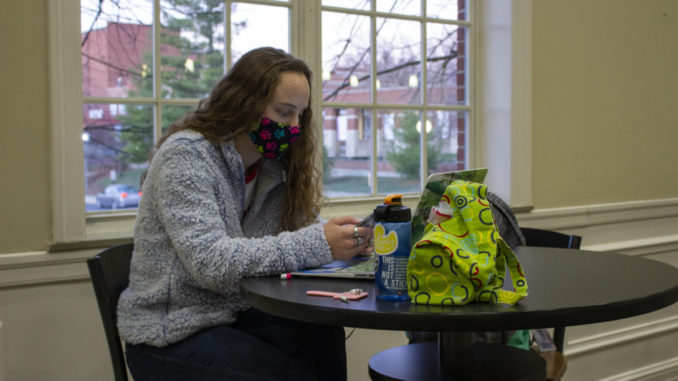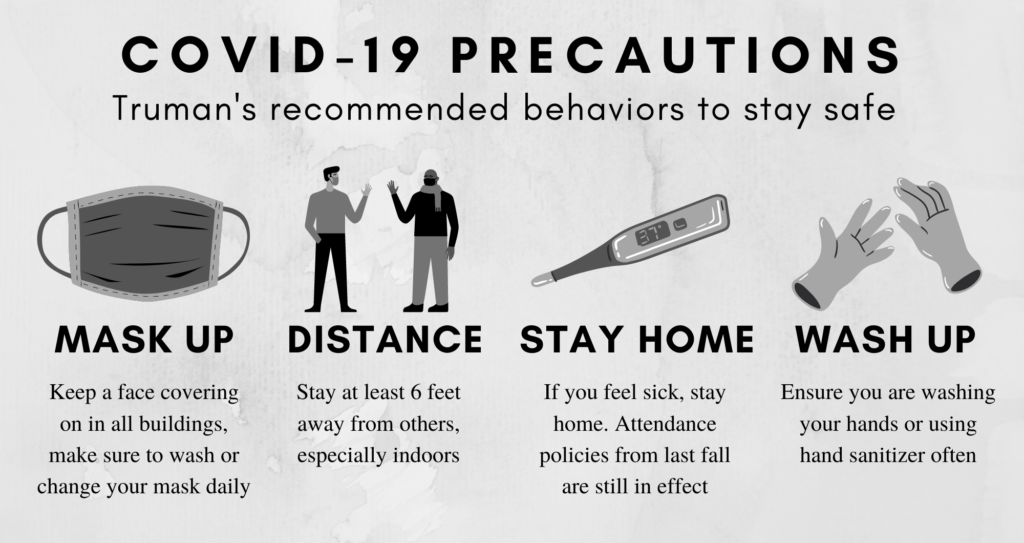
The COVID-19 guidelines established by Truman State University last fall will carry over into the spring semester as the University faces rising cases in Adair County and the addition of academic breaks.
As of Tuesday, Jan. 19, the Adair County Health Department reported 83 active cases in the area, bringing the total number of cases to 2,016. Truman reported 11 active cases and 344 recovered cases.
Listen to this week’s episode of Dry Ink on this story
Campus COVID-19 guidelines, such as mask requirements in buildings, social distancing and capacity limits on events, are still in effect this spring. The attendance policy adopted in the fall has also been clarified, Faculty Senate President Scott Alberts said, to provide more guidance on how course participation can affect grading.
In addition to regularly updating its COVID-19 web page, Truman will provide additional resources to students through a Blackboard page titled COVID-19 Info & Resources. One of these new resources will be videos of Faculty Senate’s COVID-19 working group, consisting of Alberts, Christine Harker and Nancy Daley-Moore, talking about the latest COVID-19 updates and communication. The first video, during which the group discusses the return to campus, was released Jan. 6.
Watch the first Blackboard video from Faculty Senate’s COVID-19 working group here
“For the spring, I think the main thing is to keep it going,” Alberts said. “Last semester, we were pretty successful … so mainly what we’re really talking about is, you know, keep it going.”
Brenda Higgins, associate vice president for student health and wellness, could not be reached for comment.
Despite the University adding academic breaks into the spring schedule, Alberts said the COVID-19 working group recommends students, faculty and staff not travel to prevent spread of the coronavirus. As of Monday, Alberts said the University had not seen any transmission of the virus in the classroom.
Alberts said while some might see the breaks as a risky opportunity for travel, the schedule was overwhelmingly supported by students.
“I was part of those discussions when we talked about doing this compressed semester and I think it worked pretty well, but man was everybody [over] worked by the end of the semester,” Alberts said.
Students that do travel, Alberts said, are encouraged to self-quarantine before and after returning to campus.
While this won’t perfectly stop the spread of the virus, Alberts said, it is a preventative measure that is effective when coupled with additional measures.
“If you’re going home all the time, that’s again that idea that every time you do that, you’re rolling the dice and you don’t want to roll the dice too many times,” Alberts said.
Alberts said some faculty are implementing self-quarantine times built into their course schedules around breaks, but that is not a requirement for faculty.
Alberts said the Faculty Senate working group has been working on stressing individual responsibility to reduce the spread of COVID-19. He said students should be thinking through all options before going into crowded areas — such as grocery stores — and do what is best for individual circumstances.
“I’m feeling pretty good about this semester,” Alberts said. “We’re not in a perfect situation, you know, lots of things we’re making it up as we go, but I’m feeling pretty good about it.”

